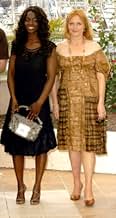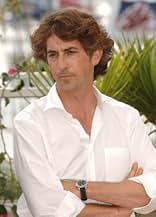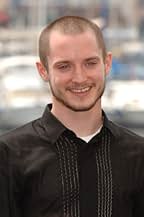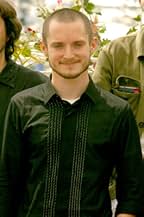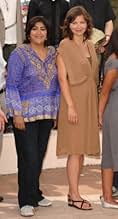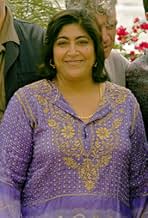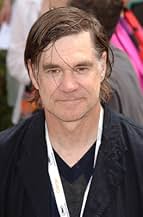Paris, je t'aime
IMDb RATING
7.2/10
76K
YOUR RATING
Through the neighborhoods of Paris, love is veiled, revealed, imitated, sucked dry, reinvented, and awakened.Through the neighborhoods of Paris, love is veiled, revealed, imitated, sucked dry, reinvented, and awakened.Through the neighborhoods of Paris, love is veiled, revealed, imitated, sucked dry, reinvented, and awakened.
- Awards
- 3 wins & 2 nominations total
Melchior Derouet
- Thomas (segment "Faubourg Saint-Denis")
- (as Melchior Beslon)
Featured reviews
Although I live in Minnesota, I have been studying in France lately and came across this bizarre gem of a film.
This movie was amazing, to say the least. A creative and unique film, the different directors each lent something different to their interpretation of love in the City of Light. The first instinct is to attempt to fit each one of these little stories into an overall storyline, much as can be done with 2003's Love Actually. This attempt, however, renders the magic of each individual segment obsolete. When taken at face value, with each of the short segments taken as its own individual film, the love stories together tell a beautiful message.
The film is strikingly bizarre at times -- often to the point of confusion -- and each individual segment can be hard to follow. Still, to a watcher who pays close attention to each of the segments, the short plot lines become clear after a short time. The confusion is almost intriguing; it keeps you on the edge of your seat waiting for what will come next. It leaves the viewer wondering "Did that really just happen?" yet also leaves them satisfied that it did, indeed, occur. It's the kind of movie where the viewer, upon leaving the theater, can't actually decide whether they loved it or they hated it. The initial reaction is to go and watch it again and again, just to see these individual lives blend together into a cinematic masterpiece.
The interesting decision to make the movie multilingual adds something to the spectrum of people who can relate. It adds to the reality of the film -- here, the American tourists speak English, the Parisians French, and so on. The number of people that the film encompasses leads to an understanding of the international language of love.
From sickness to the supernatural, the love of parents to the love of husbands, this film covers all the bases of romantic storytelling. In its beautiful and quirky way, each unique event somehow falls into place to tell a story: that of all types, sizes, nationalities, and shapes of love.
This movie was amazing, to say the least. A creative and unique film, the different directors each lent something different to their interpretation of love in the City of Light. The first instinct is to attempt to fit each one of these little stories into an overall storyline, much as can be done with 2003's Love Actually. This attempt, however, renders the magic of each individual segment obsolete. When taken at face value, with each of the short segments taken as its own individual film, the love stories together tell a beautiful message.
The film is strikingly bizarre at times -- often to the point of confusion -- and each individual segment can be hard to follow. Still, to a watcher who pays close attention to each of the segments, the short plot lines become clear after a short time. The confusion is almost intriguing; it keeps you on the edge of your seat waiting for what will come next. It leaves the viewer wondering "Did that really just happen?" yet also leaves them satisfied that it did, indeed, occur. It's the kind of movie where the viewer, upon leaving the theater, can't actually decide whether they loved it or they hated it. The initial reaction is to go and watch it again and again, just to see these individual lives blend together into a cinematic masterpiece.
The interesting decision to make the movie multilingual adds something to the spectrum of people who can relate. It adds to the reality of the film -- here, the American tourists speak English, the Parisians French, and so on. The number of people that the film encompasses leads to an understanding of the international language of love.
From sickness to the supernatural, the love of parents to the love of husbands, this film covers all the bases of romantic storytelling. In its beautiful and quirky way, each unique event somehow falls into place to tell a story: that of all types, sizes, nationalities, and shapes of love.
I was lucky enough to attend a screening in Stockholm for this elegantly expressed, enjoyable, and thought-provoking film. With romance as the heaviest weapon in its arsenal, Paris je t'aime boldly plunges into love in Paris, navigating the different forms in eighteen separate "quartiers" but without pouting Parisiennes and saccharine formulas. Its goldmine undoubtedly stems from frustration on the directors' parts frustration over only having 5-10 minutes of screen time thereby you are only presented with the best and most assured direction from each party.
Debating whether or not I should review all 18 segments, I reached the conclusion that it would be merely redundant and long-winded. Instead simply rest assured that each director graces the film with their eccentric styles and skills, and certainly you'll find your favourite. Although Gus Van Sant cannot resist the temptation to be introspective, his LES MARAIS is one of the better contributions, even sneaking in a well-placed Kurt Cobain reference. The Coen brothers recreate one of the more accessible segments in Paris, a scene with a muted but emotionally transparent Steve Buscemi, deadpan humour and clever camera angles that surely generated the most laughter in my theatre, and perhaps rightly so.
In this way, all story lines are exquisitely unique filtered through the minds of different directors but the one that deviates the most from the rest is Vincenzo Natali's QUARTIER DE LA MADELEINE, a dark horror-Gothic love starring Elijah Wood as a lost tourist in the backstreets of Paris in the night who meets a vampiress. With a black-and-white format but blood-red colour contrast that seems to incongruously bleed off screen, it nearly becomes a pastiche of Sin City a refreshing eerie and visual turn in an otherwise fairly grounded film.
Yet my single favourite segment was FAUBOURG SAINT-DENIS by Tom Tykwer but I think I was conditioned to think so, given that I went in the theatre with him as my favourite and nudged my friend in the side saying "finally, that's my favourite director here". Nevertheless, it cannot be denied that Tykwer delivers a lovely segment in which a blind boy picks up the phone, and hears from his girlfriend (Portman - for once not annoying) that she breaks up with him, and he reflects on their relationship. As is Tywker's style, the story is dizzyingly fast-paced, kinetic and repetitive, featuring screaming and running (Lola Rennt) making it the most adrenaline-pumping segment in Paris je t'aime and possibly also the most touching once Tywker starts wielding his most powerful tool music.
To fill the negative account, clearly not all directors manage as touching as Tywker, Van Sant, Cohens, Coixet and Dépardieu. Sylvain Chomet scrapes the bottom of the pile by carving out a truly disposable segment in which a little boy retells the story of how his parents met. They are two lonely mimes. This part is so in-your-face French and desperately quirky that it is insulting to international viewers. Suwa also directs a poor and fluffy segment with an unusually haggard-looking Juliette Binoche whom mourns the loss of her son. Nothing else happens. Finally, the wrap-up and interweaving of the 18 stories in the end feels somewhat rushed and half-hearted.
Yet Paris je t'aime truly spoils you with quality, for all the other stories are well-crafted with crisp acting and amusing writing. It is certainly one of the highlights of 2006 (not saying much, I suppose) and a very personal film in the sense that it is unavoidable to pick a favourite and a least favourite. Highly recommended both to mainstream of "pretentious" (heh) audiences.
8 out 10
Debating whether or not I should review all 18 segments, I reached the conclusion that it would be merely redundant and long-winded. Instead simply rest assured that each director graces the film with their eccentric styles and skills, and certainly you'll find your favourite. Although Gus Van Sant cannot resist the temptation to be introspective, his LES MARAIS is one of the better contributions, even sneaking in a well-placed Kurt Cobain reference. The Coen brothers recreate one of the more accessible segments in Paris, a scene with a muted but emotionally transparent Steve Buscemi, deadpan humour and clever camera angles that surely generated the most laughter in my theatre, and perhaps rightly so.
In this way, all story lines are exquisitely unique filtered through the minds of different directors but the one that deviates the most from the rest is Vincenzo Natali's QUARTIER DE LA MADELEINE, a dark horror-Gothic love starring Elijah Wood as a lost tourist in the backstreets of Paris in the night who meets a vampiress. With a black-and-white format but blood-red colour contrast that seems to incongruously bleed off screen, it nearly becomes a pastiche of Sin City a refreshing eerie and visual turn in an otherwise fairly grounded film.
Yet my single favourite segment was FAUBOURG SAINT-DENIS by Tom Tykwer but I think I was conditioned to think so, given that I went in the theatre with him as my favourite and nudged my friend in the side saying "finally, that's my favourite director here". Nevertheless, it cannot be denied that Tykwer delivers a lovely segment in which a blind boy picks up the phone, and hears from his girlfriend (Portman - for once not annoying) that she breaks up with him, and he reflects on their relationship. As is Tywker's style, the story is dizzyingly fast-paced, kinetic and repetitive, featuring screaming and running (Lola Rennt) making it the most adrenaline-pumping segment in Paris je t'aime and possibly also the most touching once Tywker starts wielding his most powerful tool music.
To fill the negative account, clearly not all directors manage as touching as Tywker, Van Sant, Cohens, Coixet and Dépardieu. Sylvain Chomet scrapes the bottom of the pile by carving out a truly disposable segment in which a little boy retells the story of how his parents met. They are two lonely mimes. This part is so in-your-face French and desperately quirky that it is insulting to international viewers. Suwa also directs a poor and fluffy segment with an unusually haggard-looking Juliette Binoche whom mourns the loss of her son. Nothing else happens. Finally, the wrap-up and interweaving of the 18 stories in the end feels somewhat rushed and half-hearted.
Yet Paris je t'aime truly spoils you with quality, for all the other stories are well-crafted with crisp acting and amusing writing. It is certainly one of the highlights of 2006 (not saying much, I suppose) and a very personal film in the sense that it is unavoidable to pick a favourite and a least favourite. Highly recommended both to mainstream of "pretentious" (heh) audiences.
8 out 10
Greetings again from the darkness. 18 directors of 18 seemingly unrelated vignettes about love in the city of lights. A very unusual format that takes a couple of segments to adjust to as a viewer. We are so accustomed to character development over a 2 hour movie, it is a bit disarming for that to occur in an 8 minute segment.
The idea is 18 love/relationship stories in 18 different neighborhoods of this magnificent city. Of course, some stand up better than others and some go for comedy, while others focus on dramatic emotion. Some very known directors are involved, including: The Coen Brothers, Wes Craven, Alfonso Cuaron, Alexander Payne, Gus Van Sant and Gurinda Chadha. Many familiar faces make appearances as well: Steve Buscemi, Barbet Schroeder, Catalina Sandino Moreno, Ben Gazzara, Gena Rowlands, Gerard Depardieu, Juliette Binoche, Willem Dafoe, Nick Nolte, Maggie Gyllenhaal, Marianne Faithful, and Bob Hoskins.
One of the best segments involves a mime, and then another mime and the nerdy, yet happy young son of the two mimes. Also playing key roles are a red trench coat, cancer, divorce, sexual fantasy, the death of a child and many other topics. Don't miss Alexander Payne (director of "Sideways") as Oscar Wilde.
The diversity of the segments make this interesting to watch, but as a film, it cannot be termed great. Still it is very watchable and a nice change of pace for the frequent movie goer.
The idea is 18 love/relationship stories in 18 different neighborhoods of this magnificent city. Of course, some stand up better than others and some go for comedy, while others focus on dramatic emotion. Some very known directors are involved, including: The Coen Brothers, Wes Craven, Alfonso Cuaron, Alexander Payne, Gus Van Sant and Gurinda Chadha. Many familiar faces make appearances as well: Steve Buscemi, Barbet Schroeder, Catalina Sandino Moreno, Ben Gazzara, Gena Rowlands, Gerard Depardieu, Juliette Binoche, Willem Dafoe, Nick Nolte, Maggie Gyllenhaal, Marianne Faithful, and Bob Hoskins.
One of the best segments involves a mime, and then another mime and the nerdy, yet happy young son of the two mimes. Also playing key roles are a red trench coat, cancer, divorce, sexual fantasy, the death of a child and many other topics. Don't miss Alexander Payne (director of "Sideways") as Oscar Wilde.
The diversity of the segments make this interesting to watch, but as a film, it cannot be termed great. Still it is very watchable and a nice change of pace for the frequent movie goer.
Delightful film directed by some of the best directors in the industry today. The film is also casting some of the great actors of our time, not just from France but from everywhere.
My favorite segments:
14th arrondissement: Carol (Margo Martindale), from Denver, comes to Paris to learn French and also to make a sense of her life.
Montmartre: there was probably not a better way to start this movie than with this segment on romantic Paris.
Loin du 16ème: an image of Paris that we are better aware of since the riots in the Cités. Ana (Catalina Sandino Moreno) spends more time taking care of somebody else's kid (she's a nanny) than of her own.
Quartier Latin: so much fun to see Gérard Depardieu as the "tenancier de bar" with Gena Rowlands and Ben Gazzara discussing their divorce.
Tour Eiffel: don't tell me you didn't like those mimes!
Tuileries: such a treat to see Steve Buscemi as the tourist who's making high-contact (a no- no) with a girl in the Metro.
Parc Monceau: Nick Nolte is great. Ludivine Sagnier also.
I've spend 3 days in Paris in 2004 and this movie makes me want to go back!
Seen in Barcelona (another great city), at the Verdi, on March 18th, 2007.
84/100 (***)
My favorite segments:
14th arrondissement: Carol (Margo Martindale), from Denver, comes to Paris to learn French and also to make a sense of her life.
Montmartre: there was probably not a better way to start this movie than with this segment on romantic Paris.
Loin du 16ème: an image of Paris that we are better aware of since the riots in the Cités. Ana (Catalina Sandino Moreno) spends more time taking care of somebody else's kid (she's a nanny) than of her own.
Quartier Latin: so much fun to see Gérard Depardieu as the "tenancier de bar" with Gena Rowlands and Ben Gazzara discussing their divorce.
Tour Eiffel: don't tell me you didn't like those mimes!
Tuileries: such a treat to see Steve Buscemi as the tourist who's making high-contact (a no- no) with a girl in the Metro.
Parc Monceau: Nick Nolte is great. Ludivine Sagnier also.
I've spend 3 days in Paris in 2004 and this movie makes me want to go back!
Seen in Barcelona (another great city), at the Verdi, on March 18th, 2007.
84/100 (***)
Sadly, this is an awful grab bag of mostly trivial stories. Certainly it is ambitious and interesting as a concept, and Paris looks beautiful, but the producers didn't rein in the directors and what appears winning in theory becomes a lazy mishmash in execution. Each director was given five minutes of screen time and two days to shoot their film. Almost all of the directors figured they could dispense with writers and do it themselves. A bit of ego, a bit of film school, and a misunderstanding that even five minutes of screen time requires a writer's hand, especially so since the short time frame demands concise story telling skills.
Indeed, some of these film makers, e.g. Christopher Doyle, have barely sat in a director's chair, much less be worth trumpeting as members of an extraordinary group of visionaries. And the concept involves love stories and the love for Paris. What connection is there with this concept and the filmography of Joel and Ethan Coen? In fact the heavy American and British presence seems more mercenary than visionary from the producing end of things. Ben Gazzara and Gena Rowlands playing two Americans finalizing their divorce in a restaurant could have been filmed in New York or Chicago and shipped over to France for attachment to the movie. Worse, this episode relegates a giant of French cinema, Gerard Depardieu, to the minuscule part of the restaurant owner. There's nothing wrong with having some stories about tourists and expatriates, but this collection relies far too much on it. The bulk of the Parisians in this film are relegated to background chatter and bit parts. Surprisingly, even the city is relegated to background fodder. It appears that almost none of the film makers have any sense of Paris, or what to do with it given the opportunity to make a small film there. Many take place in nondescript indoor locations, or in the case of the Elijah Wood episode, a meaningless dark street straight out of 'Sin City.' Story wise, this is a director's film. Therefore the writing is weak and in some cases almost non-existent. In the case of Cuaron's episode with Nick Nolte, even the direction is non-existent (almost entirely a long shot track of Nolte yakking away to his nubile daughter as they walk down a street -- once again, a heavy American element with no trace of Paris except some dialogue). Some of the vignettes have "punchlines", while others merely fade away or end pointless and lost. The two most "commercial" feature Steve Buscemi in a cartoonish skit in a Metro station, and an absurd tryst between Elijah Wood and a vampiress. Both stand out but for the wrong reasons. Buscemi is forced to say nothing throughout his episode, and to behave like a punching bag for no reason. At least it IS snappily directed, and makes its point and ends with an exclamation. But it's also more clichéd American-in-Paris tourism. The Wood vampiress story not only doesn't belong in this film, it is also extremely predictable as a vampire sketch.
Many of the other stories seem either a small part of a bigger film, or a made-up hodgepodge to fill five minutes. To each his own as to the merits of the results. Certainly this smörgåsbord provides enough promise in its theme to delight those who think they're getting a taste of Paris along with humanistic stories (rather than the usual gangster, spy, or sleaze films using the city for its location). But I think the producers should have demanded that the directors adhere to the concept rather than allow them free rein to indulge in half-thought out skits that have only an arbitrary connection to the locations of the title city.
Indeed, some of these film makers, e.g. Christopher Doyle, have barely sat in a director's chair, much less be worth trumpeting as members of an extraordinary group of visionaries. And the concept involves love stories and the love for Paris. What connection is there with this concept and the filmography of Joel and Ethan Coen? In fact the heavy American and British presence seems more mercenary than visionary from the producing end of things. Ben Gazzara and Gena Rowlands playing two Americans finalizing their divorce in a restaurant could have been filmed in New York or Chicago and shipped over to France for attachment to the movie. Worse, this episode relegates a giant of French cinema, Gerard Depardieu, to the minuscule part of the restaurant owner. There's nothing wrong with having some stories about tourists and expatriates, but this collection relies far too much on it. The bulk of the Parisians in this film are relegated to background chatter and bit parts. Surprisingly, even the city is relegated to background fodder. It appears that almost none of the film makers have any sense of Paris, or what to do with it given the opportunity to make a small film there. Many take place in nondescript indoor locations, or in the case of the Elijah Wood episode, a meaningless dark street straight out of 'Sin City.' Story wise, this is a director's film. Therefore the writing is weak and in some cases almost non-existent. In the case of Cuaron's episode with Nick Nolte, even the direction is non-existent (almost entirely a long shot track of Nolte yakking away to his nubile daughter as they walk down a street -- once again, a heavy American element with no trace of Paris except some dialogue). Some of the vignettes have "punchlines", while others merely fade away or end pointless and lost. The two most "commercial" feature Steve Buscemi in a cartoonish skit in a Metro station, and an absurd tryst between Elijah Wood and a vampiress. Both stand out but for the wrong reasons. Buscemi is forced to say nothing throughout his episode, and to behave like a punching bag for no reason. At least it IS snappily directed, and makes its point and ends with an exclamation. But it's also more clichéd American-in-Paris tourism. The Wood vampiress story not only doesn't belong in this film, it is also extremely predictable as a vampire sketch.
Many of the other stories seem either a small part of a bigger film, or a made-up hodgepodge to fill five minutes. To each his own as to the merits of the results. Certainly this smörgåsbord provides enough promise in its theme to delight those who think they're getting a taste of Paris along with humanistic stories (rather than the usual gangster, spy, or sleaze films using the city for its location). But I think the producers should have demanded that the directors adhere to the concept rather than allow them free rein to indulge in half-thought out skits that have only an arbitrary connection to the locations of the title city.
Did you know
- TriviaSince the Coen Brothers knew they only had two days to shoot their sequence and were working on a very tight schedule, they elected to mount it in a metro station just in case it might rain.
- GoofsIn the last segment, where the grave of Jean Paul Sartre and Simone de Beauvoir is shown, the audio and subtitles both say Simon Bolivar. This is not a goof; rather, it is showing that Carol (Margo Martindale's character) is not completely confident in French and/or history.
- Quotes
Francine: Thomas, listen. Listen. There are times when life calls out for a change. A transition. Like the seasons. Our spring was wonderful, but summer is over now and we missed out on autumn. And now all of a sudden, it's cold, so cold that everything is freezing over. Our love fell asleep, and the snow took it by surprise. But if you fall asleep in the snow, you don't feel death coming. Take care.
- SoundtracksRun to the Mosque
Written by Craig Pruess
(P) 2006 Victoires International
(C) 2006 Emma Productions
Segment "Quais de Seine"
- How long is Paris, Je T'aime?Powered by Alexa
Details
- Release date
- Countries of origin
- Official site
- Languages
- Also known as
- Paris je t'aime
- Filming locations
- Production companies
- See more company credits at IMDbPro
Box office
- Budget
- $13,000,000 (estimated)
- Gross US & Canada
- $4,899,278
- Opening weekend US & Canada
- $39,242
- May 6, 2007
- Gross worldwide
- $17,489,601
- Runtime
- 2h(120 min)
- Color
- Sound mix
- Aspect ratio
- 1.85 : 1
Contribute to this page
Suggest an edit or add missing content







